First off, I am fully aware that most people will go their entire lives without taking a month-long sabbatical, let alone taking an entire Sabbatical year.
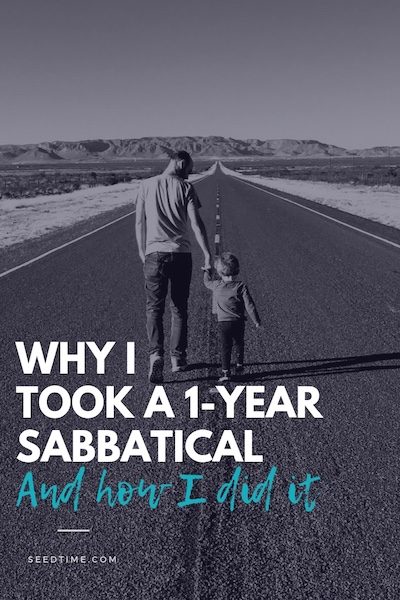
I am also aware that many people feel stuck or trapped with work to a point that they can’t even imagine taking off more than a week – I used to be one.
So please understand my heart in sharing this: I want to shine a light on our awesome God who made this impossible thing possible.
The entire thing was like watching a miracle unfold and I am forever grateful to have been along for the ride.
And one last thing before we dive in. This article starts with WHY I took a year-long sabbatical and in the second half I will shift to HOW we pulled it off logistically without shutting down our business.
How I knew I needed a Sabbatical leave
In 2016 I spent most of the year working harder than I had ever worked and it was like I was going nowhere.
I felt like I was spinning my wheels. I felt like I was doing all the right things, but just wasn’t seeing much fruit.
And in late 2016 – for the first time since I began this business – I woke up on a Monday morning and was dreading going to work.
That was a wake-up call to me that something wasn’t right.
From the very beginning, I have loved this amazing business that God has allowed me to steward and while not every moment has been perfect, in general, I really love my work and look forward to what each day brings.
In my past, I have had some jobs that I have hated and I had to endure some for many years.
I will never forget how demoralized I felt when I was stuck doing work I hated with no way out. I never want my business to take me back to the same place.
In December of 2016, it dawned on me that this was what burn-out felt like and taking a break would be beneficial.
I was only a few weeks away from leaving for our month-long sabbatical (a trip we have taken for the past 5 years) so the timing couldn’t have been better.
I knew how refreshing that trip had been every year and that was going to be my saving grace.
Or so I thought.
A few weeks later we arrived in sunny Scottsdale, AZ and as usual, I completely disconnected from work.
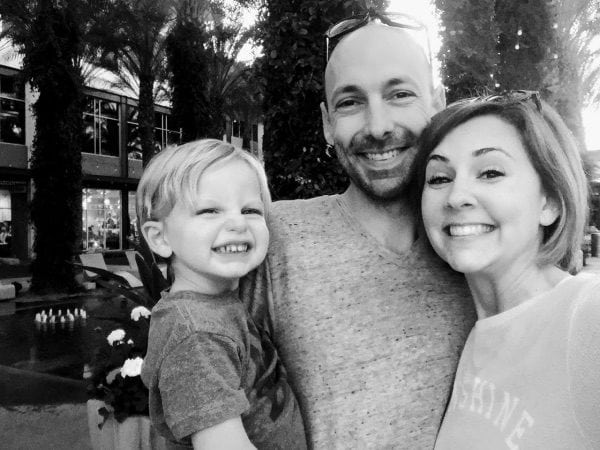
But for some reason, I began to realize that something was different this year.
Before I knew it we were in the car on our way back to Nashville (with a few fun stops along the way).
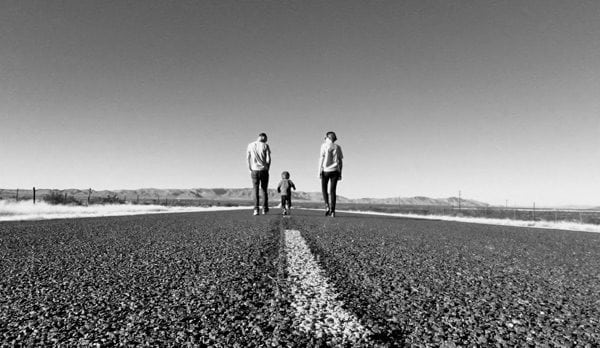
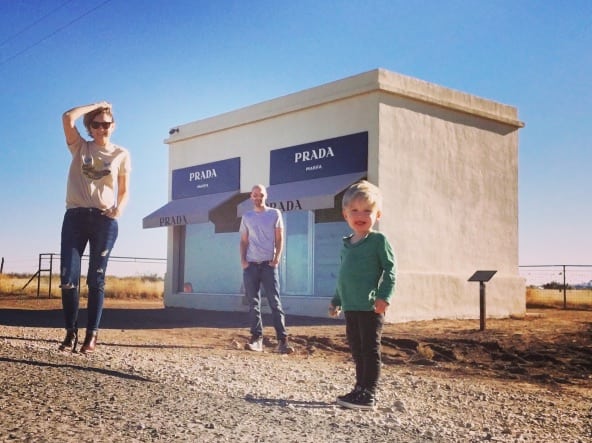
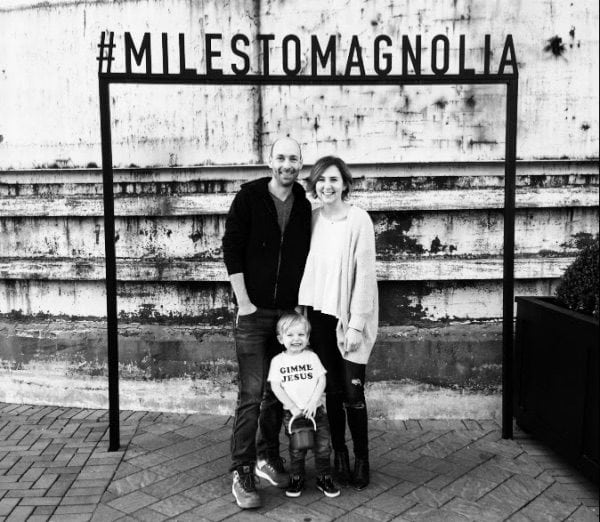
What does Sabbatical mean?
Shortly after we got back I was sitting at my desk thinking a bit about my goals for the rest of the year.
Right next to my desk I have a whiteboard that I write monthly goals on so that I can stay on task.
So far in 2017, I was right on track:
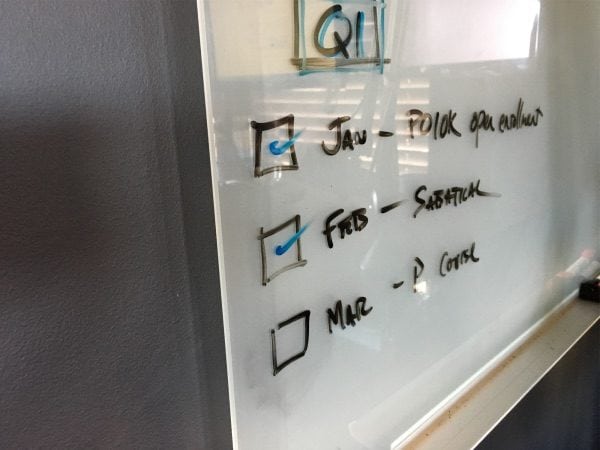
As I stared at the February goal that I had just checked off I wasn’t sure if I had spelled “Sabbatical” correctly.
After all, spelling Sabbatical is kinda tough and I don’t exactly write it every day.
So I googled it.
Sabbatical definition
The first result was a Wikipedia article that confirmed that I had spelled it incorrectly. But before I had a chance to close the browser window, I read a little further into the article and quickly became fascinated by how they define a sabbatical and what it actually means.
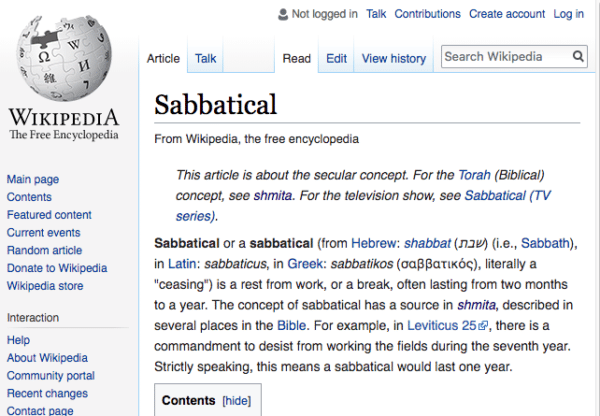
At this point, I didn’t even realize that the concept of a sabbatical was a Biblical idea (somehow it had never dawned on me that it was from the same root word as sabbath).
And, funny enough, it took Wikipedia to teach me about the Bible. 😉
How Wikipedia defines a sabbatical leave:
“Sabbatical or a sabbatical (literally a “ceasing”) is a rest from work or a break, often lasting from two months to a year. The concept of sabbatical has a source in Shmita, described in several places in the Bible. For example, in Leviticus 25, there is a commandment to desist from working the fields during the seventh year. Strictly speaking, this means a sabbatical would last one year.”
When I read that last line, it jumped off the page at me and it was the first hint that God used to direct me in this way. I had never know that a true sabbatical lasts one year.
The next step of the rabbit trail was reading more about the Shmita (mentioned above).
What is a Biblical sabbatical year?
So I continued my Wikipedia Bible study 😉 with this Shmita entry (edited for brevity):
“The sabbath year, also called the sabbatical year is the seventh year of the seven-year agricultural cycle…
During Shmita, the land is left to lie fallow and all agricultural activity, including plowing, planting, pruning, and harvesting is forbidden… Other cultivation techniques (such as watering, fertilizing, weeding, spraying, trimming and mowing) may be performed as a preventive measure only, not to improve the growth of trees or other plants…
Chapter 25 of the Book of Leviticus promises bountiful harvests to those who observe the Shmita, and describes its observance as a test of religious faith…”
As I read this I remembered reading about how modern-day farmers that allowed their land to rest regularly had much better results than those who didn’t.
The theory being that the soil becomes depleted and the plants suffer and produce less fruit if the land is continuously farmed without a rest period.
Hmmm…
This was sounding quite familiar to what I was seeing in the Bible about the Sabbath year of rest for farmers.
Could God have actually given them (and us) specific direction on how to maximize crop yields?
And what was even more interesting to me was that just as land becomes depleted by not having a rest, I don’t think there was any better word to describe how I felt after 2016.
As I was beginning to sense that God was using this illustration to ask me if I could TRUST Him enough to take the ENTIRE year off, my first reaction was panic.
- How am I going to pay the bills?
- The site that I have worked nearly a decade on will dissolve to nothing.
- Everyone will think I am weird.
- Or worse – they will think I am a lazy bum not taking care of my family.
- What about all the plans I had for the year?
- What if we lose our house?
That is just a small sampling of the numerous thoughts and fears that raced through my mind as I began to entertain this idea of taking a Sabbatical leave for a year.
Next stop: talk to Linda
Later that day I told Linda that we needed to talk. A small part of me was secretly hoping that she would fly off the handle and convince me that this Sabbatical leave idea was from the devil. 😉
One of my favorite things I love about being a Christian is all the adventures that God leads us on if we step out in faith when He calls us, but this one was a big one and I was having trouble wrapping my brain around all the repercussions of it.
I waited until we got our son to bed because I knew this would take a little time.
“Honey, I think I might have gotten something big from God today…”
“Oh yea?!”, she said – clearly having no idea what I was going to say next.
I proceeded to explain how I had misspelled Sabbatical and went and learned about it on Wikipedia and I just sensed that still, small voice directing me…
“And so…” I hesitated.
“I kinda think I am supposed to take the rest of the year off.”
I braced myself, not knowing what she was going to say next. It should come as no surprise to me, but she was completely on board.
In fact, God had dropped this idea on her heart a couple weeks earlier (when we were driving back to Nashville from Scottsdale), but she felt like she was supposed to wait until I got the direction before telling me.
Getting confirmation like that gave me a little hope that I may not be crazy after all.
But it also forced me to come to terms with what a step of faith like this actually means.
One of the looming questions being:
How in the world am I going to pay the bills if I don’t work for a year?
I didn’t have that answer yet, but I began getting excited because if God was calling me to do something like this, surely He was going to do something grand.
The next day as I was re-reading Leviticus 25 (where God talks about this whole Sabbath year idea) I got down to verse 20 where (presumably) the Israelites are freaking out at this request God is making to not farm for a year.
“You may ask, “What will we eat in the seventh year if we do not plant or harvest our crops?” I will send you such a blessing in the sixth year that the land will yield enough for three years. While you plant during the eighth year, you will eat from the old crop and will continue to eat from it until the harvest of the ninth year comes in.”
God wasn’t calling them to a yearlong fast or to utter destruction. In fact, He promised He would provide enough in the prior year to sustain them.
As I thought about my own life, it dawned on me that the prior 2 years had been abundant years with our business and had allowed us to build up pretty good savings.
Had that been God”s plan for that money all along?
We would soon find out.
How the Sabbatical Year played out
Over the course of 2017, while on my Sabbatical leave, all my fears just slowly faded as month after month, we were able to pay the bills, feed ourselves, and our business didn’t disintegrate.
By His grace, our website continued generating income month after month (just one of the reasons that blogging is the best business in the world) and we made it all year and barely had to dip into savings.
Now that we are on this side of it, it seems like it was no big deal – what was I so worried about?
But at the time, when I imagined all the worst case scenarios, it was pretty intimidating.
Anyway, I don’t want to dwell on that anymore. Let”s talk a bit about the benefits.
The benefits of my Sabbatical leave I have seen (so far)
This has been the second time in my life that God has called me to a long-term (6+ months) sabbatical. And to say that the first one was life-changing would be a huge understatement.
During the first Sabbatical:
- I finally got serious about God instead of just being half-hearted in my faith.
- He began the financial education that would ultimately lead me to start this site.
- I broke off a relationship headed for marriage that would have been bad news.
After the first Sabbatical:
- I met my future wife, Linda, within weeks of returning.
- I made countless friends at church, which prior to that I only had one.
- God started me down the path of my calling.
And really those are just some of the highlights. There were just too much to mention.
All that to say, while I have noticed a few obvious benefits of the sabbatical thus far, I am confident that plenty more is to come.
In the meantime, here are 3 big ones that stand out to me:
1. A complete reset
For as depleted as I felt starting 2017, I could not feel more refreshed and excited to get to work now.
I had grown to despise writing, and now I am loving it again.
I feel like I am starting a business from scratch – with the eyes of what”s possible, instead of all the things I HAVE to do – but with the added benefit of having a huge head start.
2. Lots of little course corrections
In Psalm 139 David said,
“Search me [thoroughly], O God, and know my heart; test me and know my anxious thoughts; And see if there is any wicked or hurtful way in me, And lead me in the everlasting way.”
It is pretty crazy that we can have stuff in our hearts that we aren’t aware of until God reveals them.
I feel like there were a handful of little things that God shined a light on for me to see.
None of them by themselves were a big deal at all, but it was more nipping them in the bud, to prevent them from turning into something bigger down the road.
I much prefer the gentle, private correction from the Lord by taking care of things on the front end, rather than having to deal with bigger issues that they could become later on.
3. Direction for the business
All year long, almost every time I ran into a friend, they would inevitably ask me, “So, have you gotten any big revelation yet?”
To which I would have to reply, “Nope, not yet,” which makes for a boring conversation.
It wasn’t that I felt God had promised to give me some big revelation, but it just seemed to me (and apparently everyone else) that He should. 😉
The reality is that He probably needed to spend 11 and a half months clearing my head of the clutter and revealing some heart issues before He could give me the direction that I sought.
And that is pretty much what happened to me.
Just a few weeks ago, I began sensing really strongly that as I go into this new year He wanted me to share (with you) some of the miraculous stuff He has done in my family”s life the last few years.
He showed me that I have been hiding some of His wondrous works and though I have been praising Him privately for them, He wants me to share some of these testimonies of His goodness for all to see.
“Oh give thanks to the LORD, call upon His name; Make known His deeds among the peoples. Sing to him, sing praise to him; tell of all his wonderful acts.” ”“1 Chronicles 16:8-9
So that is why I wrote this article.
Taking a sabbatical year only could have happened by the grace of God.
None of my planning, strategy, worrying, or anything else could have made it possible.
Nothing but God.
So what does all this mean to you?
Well, for starters I don’t think it means that you should go take a year-long sabbatical (though for some of you it might).
What I love about God is that He calls us to different things at different times, and it would be foolish of me to try to push off this thing that He called me to do on everyone else.
BUT…
I do know that almost all of us struggle in this area of resting and living a Sabbath lifestyle. And my encouragement to you would be to start praying and stretching your faith in that area.
Maybe for you, it means – ACTUALLY doing no work on Sundays and just enjoying your family.
Maybe it means stretching yourself to take a week or a month Sabbatical and just seeing what God does in your life.
And maybe for a few of you, it will mean taking a year-long sabbatical.
Regardless, I have NEVER heard a single regret from anyone who has taken a Sabbatical leave – regardless of length.
And be warned, whatever it is for you, it will likely seem too difficult or impossible – but that”s good news…
Because if you can’t do it in your own strength, you will get to see God do some awesome stuff!
FAQs
I have told a handful of people about the whole thing and I commonly got these questions, so in case you are curious…
What did you do all day?
Not coincidentally, about 6 weeks after I decided to take the year off, we had a surprise adoption of our baby girl.
Our plan was to adopt much later in the year or in 2018, but God had different plans.
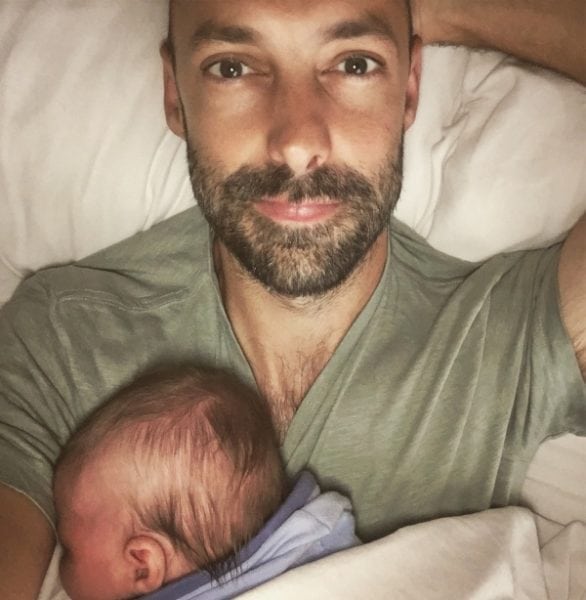
This allowed me far more concentrated time with our newborn – as well as our 3-year-old – than I otherwise would have been able to give.
I consider myself so blessed that I got to spend all those countless hours with both my kids at such a young age. I will forever cherish that time together.
I spent a lot of time working in the yard. Maybe it”s because I typically sit at a desk all day, but I LOVE being outside and doing “real work” by getting dirty and sweating a little bit.
It actually refreshes me. So I did a lot of it.
One of my big projects for the year was building our veggie garden:

I also continued to spend a lot of time alone reading and praying. I was able to read lots of good stuff last year.
And I was pretty much head chef for the entire year and began honing my skills by taking some cooking classes online.
And one of my guilty pleasures is selling stuff on eBay, so I continued doing that as well.
Did I get bored on your Sabbatical?
Simply put, yes.
But this is exactly what I was hoping for. Our society has all but eliminated the possibility for any of us to get bored. Think about it – most of us carry an endless form of entertainment with us at all times. And if that weren’t enough, it is beeping at us trying to get our attention all day long. Couple that with all the long hours that so many of us work and the demands of family life and it isn’t surprising that most of us haven’t been bored in over a decade.
I haven’t dug into this enough, but I have a hunch that boredom is actually a good thing and that mental space is actually beneficial for us. So that was something I was looking forward to. Just sitting by the fireplace in a comfy chair alone with no device, no book, no agenda – just sitting. Just existing and maybe getting a little bored.
I got to do a little of that, but sadly not nearly as much as I would have liked.
I was really surprised that I felt like I stayed busy without much effort. As someone who has little interest in traditional retirement (because it seems boring to me), I was really scared that I would just be twiddling my thumbs all day and be bored out of my mind.
That didn’t happen at all. Just like expenses rise to meet income, the same principle seems to apply to our time.
The hours were there each day, but they quickly got filled.
Part 2: HOW I took a year off work
In part one of this article we focused on WHY I took a year-long Sabbatical and what led me to make that decision.
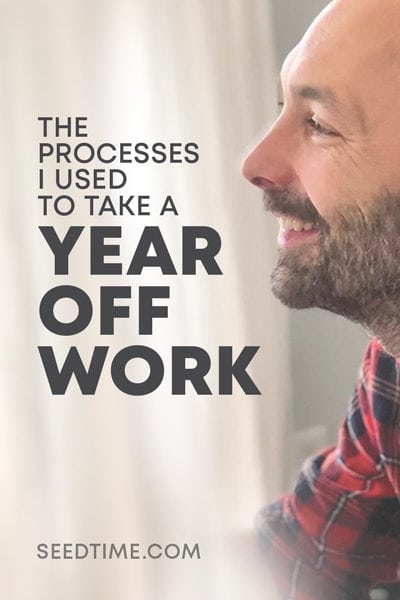
But now let’s chat about the nuts and bolts of how we pulled it off logistically – and managed to continue to eat and live indoors throughout the year.
My goal is to share what I have learned from taking six month-long Sabbaticals over the last decade and obviously a year-long one as well – just in case you are going to be doing one yourself.
The principles are basically the same – regardless of the Sabbatical length.
And while this is definitely most applicable to online entrepreneurs with web-based businesses like myself, some of the key principles will apply to all business-owners, and even some employees.
Let’s begin with 2 key lessons that have helped me develop the systems that made it possible…
1. Learn from the mistakes of others
I do my best to learn what NOT to do from others as much as what to do. Eleanor Roosevelt has a quote I love…
“Learn from the mistakes of others. You can’t live long enough to make them all yourself.”
When I was 18 I began waiting tables at a little ‘mom and pop” restaurant near my home in St. Louis. They had just recently opened up and the owners (a husband and wife team) had spent decades in the restaurant business and they knew what it took to get one off the ground and make it succeed.
I quickly realized that for them, that meant working 12+ hour days…
Every. Single. Day.
In fact, after the restaurant had been opened for 6 months, we (the waitstaff) celebrated with them because they were taking their first day off since we had opened.
At this point, I had some desire to venture out as an entrepreneur, but I hoped that there could be a better way.
And to be fair, maybe that was what they wanted to do. Maybe working nonstop 12-hour days was what they loved doing.
Regardless, the truth is that so many entrepreneurs chase after their dream to build a business and quickly find themselves becoming a slave to it.
They find themselves working crazy hours with no end in sight and seeing no way out.
From the beginning of my entrepreneurial journey, I wanted to do my best to avoid this. I didn’t really know if it was possible, but I figured there was no harm in trying.
2. We find answers to the questions we ask
We all have seen incredibly “successful” businesspeople who maybe achieved all their business aspirations, but it cost them all their time, their marriages, their faith, or relationships with their children.
By changing the questions that we ask, we will have a much better chance of achieving what we really want without having to sacrifice things that are important to us.
Tony Robbins has illustrated this point better than anyone else I have heard and he talks a little about it here…
Because I was so scarred from seeing many business owners in my life working themselves to the bone, I changed the question I always asked myself and essentially created a filter through which to make my decisions.
For those who don’t know, this blog you are reading is my business. And in 2008 after I got laid off, I began the journey to full-time blogging.
As desperate as I was to generate some income from the blog to pay rent, I fought against the temptation to ask this question:
“How can I turn this blog into a full-time living?”
And instead opted for this question:
“How can I turn this blog into a full-time living requiring as few hours as possible of my time?”
This might seem trivial, but stay with me here.
What this essentially did was force me to say NO to lots of income-earning opportunities that would have made me money, but would have taken up a lot of time.
And by sticking with the 2nd part of my question, it was easy to say NO because they didn’t fit.
The truth is that it took me a little longer to make a full-time living blogging, but because I had that filter and asked that question, I ultimately found the answer I was searching for – and I was able to create a profitable business, without requiring every moment of my time.
Seeing if the boat floats
The theory of asking better questions is easy in principle, but much more difficult to stick with it.
And after about 2-3 years of running the business, though I had continually worked to create a somewhat passive income approach to it, I had to step out and test it.
I had designed my blog business to not REQUIRE much of my time, but I loved spending my time on it and was addicted to working on it.
Taking 1 week off
In 2010 I decided to take a 1-week vacation and NOT check email at all. I was terrified that the site was going to break and when I returned Google would have removed us from the search results and many other baseless fears.
I honestly had a hard time enjoying the vacation because I was so nervous. But it was critical that I put that boat in the water to see if it floats.
And it was amazing to see that the site didn’t crash and nothing even remotely urgent came up while I was gone.
The next time, I decided to take a 10-day break and only check email 1x (for 1 hour) to scan for urgent stuff and the same thing happened – nothing!
Could I do a month?
In Feb 2012, I nervously stepped out to take a month off as we went down to Sanibel Island, FL on what I would call my first Sabbatical of sorts in over a decade…
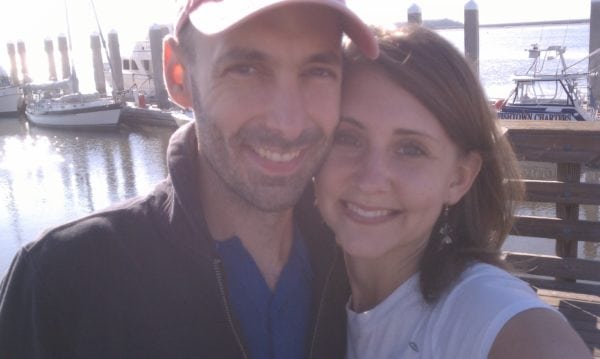
Having two week-long breaks under my belt, I was pretty comfortable with that stretch of time away from the business and had developed some systems to get me through.
But, I had no idea if they would hold up for a month.
Only one way to find out right? 😉
So that February, I did my first no-internet Sabbatical. The only exception was to scan email for one hour or less each Saturday.
By the last Saturday of the month, I was honestly feeling like I didn’t even need to check email; I had gotten comfortable with the distance.
The benefits just flat-out amazed me
The concentrated focus time with Linda strengthened our already strong marriage. Dedicating a good amount of time to prayer and the Bible each day dramatically boosted my spiritual life. On top of that, the mental clarity and clear direction for the year had me counting the days to get back to work.
I felt more refreshed than I had been in years and I had a clear focus and plan of action for the rest of the year.
Why take a month off in the first place?
It had been such a valuable experience that I decided right then and there that I would do this every year going forward.
And for the last 5 years taking a month-long Sabbatical has been our regular pattern.
I”ll get to the details of our 1-year Sabbatical in a bit, but first I want to focus on how to take a month off from your business successfully. Because if you can’t do that, you aren’t going to be able to take a year.
Focus on disconnecting, NOT on having a vacation
This is a big distinction for us. Vacations (fun as they are) tend to fill my schedule to the brim, and since we have kids, tend to also bring a level of inherent stress with them.
We are very intentional about how we use our time on Sabbatical trips. While we will do some fun stuff, the goal isn’t a vacation, but rather decompression, meditation, and connecting with God.
It should go without saying that before we had kids it was much easier: we would both spend most of the day reading, praying (alone or together), goal-setting, and listening to Biblical teaching. And then after dinner maybe watch a movie or just hang out.
Our typical daily schedule
Now that we have 2 kiddos in the mix, we have found what works best for us is alternating days.
So on one day I will take the kids and be responsible for them basically until dinner. And Linda can go to the beach, coffee-shop, library, park or anywhere else to get alone and focused. And then she takes the kids the next day and we just continue to alternate like that. And occasionally throw in a family day.
With 2 kids we obviously have less time alone together, but we try to focus on using the time AFTER the kids go to bed to chat about our goals for the year and where we think God is leading us.
Leaving vs. staying at home
As much as I hate to admit this, I have found that it is a LOT easier to have more and better focused time when I get out of town. I don’t know why exactly, but my hunch is that:
- The familiarity (and established patterns) of our home life creep back in and knock us off our schedule.
- Many of my home life demands don’t follow me to a vacation rental.
We have found renting from Airbnb or HomeAway are typically much better options than staying at hotels.
They typically have more room to move around, are more comfortable, and have a full kitchen – eating out all day long, every day for an extended time takes its toll quickly.
We also look for places that we can walk to from where we are staying. Ideally a beach or park or coffee shop.
I hate that it seems like we have to have the big expense of leaving home and renting to get the maximum benefit, but for us thus far that has been the case. Your mileage may vary. Logically, there is no reason you couldn’t get the same benefits from home – it is just tough to break those established habits and patterns.
How we keep the business afloat while we are gone
Our business is this blog you are reading. Your business very well may be different, but even if it is, hopefully there will be some takeaways for you in here.
I will go into some detail below, but honestly my strategy is really simple in that I ask myself 2 questions:
- What”s the worst case scenario? (Q1)
- What”s the likelihood that the above would happen? (Q2)
The answer to the first question is often scary, but if the answer to the second question (my best guess) is less than 20%, I go for it.
1. Schedule blog posts
I do a good bit of writing before we leave and schedule out blog posts to publish automatically. This is really easy to do with Self-Hosted WordPress.
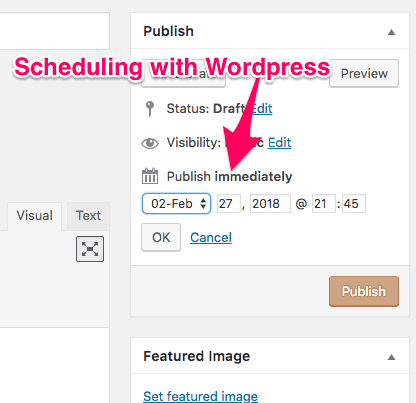
Sometimes I even “cheat” and update and republish older content that I wrote years ago. 😉
If I feel like I can’t create enough content to get scheduled out that far, I just post less frequently during the trip.
But what if you post daily? I would ask the same 2 questions above about posting weekly.
- Q1 = a small percentage of people might be upset
- Q2 = 5%
In my experience of doing this the last 10 years, I have never heard of anyone unsubscribing from getting too few emails – it is almost always the opposite; they unsubscribe all the time because they get too many emails.
So the first time I did this, I just let all the subscribers know that I was taking a month-long Sabbatical and would be posting less.
Done.
Problem solved.
Not a single person complained. And actually fewer people unsubscribed than normal. Lesson learned.
2. Schedule out emails to our subscribers
For a while, our emails were automatically sent every time a new blog post was published, so I didn’t even have to think about this.
Now we write a quick email for each blog post that we create. It definitely helps with reader engagement, but I would go back to auto-emails in a heartbeat (especially just for a month) if that was preventing me from taking a month off.
3. Blog Comments
What happens if I don’t check blog comments for a month?
Q1 = I will have missed the opportunity to connect with some readers.
Q2 = 20%
Let me start by saying that I love reader comments and normally I read all of them. But, I learned many years ago that as fun as they are, they don’t feed the family, and they can (if you let them) try to take over your life.
So, I didn’t check comments for a month. And, not surprisingly, nothing bad happened. Sure, a few spammy ones made it through, but they were easy to delete when I got back.
4. You can’t possibly ignore email for a month – can you?
On these month-long Sabbaticals my standard process has been to go to a coffee-shop each Saturday morning and dedicate no more than 1 hour to scanning through my email for urgent stuff. For me, this normally means 1-2k emails to scan through.
I literally just quickly read through subject lines as fast as I can looking for truly urgent stuff. Most times I don’t find anything urgent and ‘cheat” just a little by responding to a few really important (but not urgent) emails.
Urgent stuff would be like:
- A notice from our main Webhost that our site is down.
- Our business credit card expired and our web host will be taking down our site if we don’t update the payment method.
- Our email provider saying that we reached our monthly limit and they won’t send our emails out.
I mostly ignore really important stuff that doesn’t fall into the urgent category. The main reason being is that I have found most of the time I can take care of it when I get back. And I have yet to have an issue where I regretted NOT responding while on break.
More on my process
Gmail has a cool autoresponder feature that I always use. My standard looks something like this:
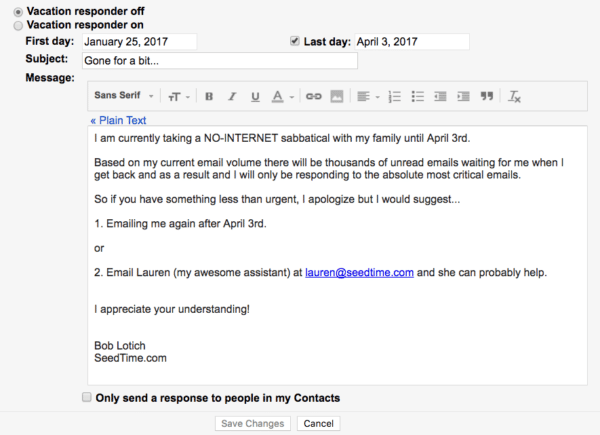
[PRO-TIP] Put the burden of responsibility on the sender
The first couple times I took a month-long break, I would get back and spend almost an entire week catching up on email. I would feel the need to respond to thousands of emails.
What made it worse was that many (if not most) of the emails I was answering, the sender had forgotten about it, already found an answer, or just didn’t care anymore.
It was almost like I wasted an entire week answering emails that didn’t matter.
Then one year I modified my OOO (Out of Office) responder to put the burden of responsibility back on the sender.
Anyone who sent me an email now had 2 options:
- Email me again after I get back (if it will still be important).
- Email my assistant (if it is truly urgent or if she can help).
This one thing probably gave me 4 days of time back. Now, when I got back to work I scanned email again and answered urgent and maybe really important emails and then hit the delete button on everything else.
And I could do it without any guilt because I knew the people would email me again if they still needed to.
Create an urgent email address
Another thing that worked well was having a dedicated email address for urgent stuff. I gave this email address to my assistant and all our contract workers and allowed them to use their best judgment when determining when to use it.
One or two times I included this email address in my OOO responder as well. If you don’t have an assistant helping you that isn’t a bad idea.
I then had that email forwarded to my phone with notifications on. It should go without saying that my main email account was removed from my phone.
In the last 5 years, I don’t think I have had 10 emails sent to this account.
Social media
Automation of posting to social media is pretty easy. There are tons of tools out there, but we use Buffer.com to take care of this for us.
Responding to replies?
For me, this falls into the category of blog commenting, so I just don’t do it when I am on leave. In theory, I could probably batch it with my weekly email check in, but I haven’t yet. If unsure, ask yourself Q1 and Q2 again.
Clean off your phone
I have found the hardest part of the whole Sabbatical thing for me is breaking my regular habits. This is why I delete off any apps that might tempt me. So delete all social media apps off. Since I use the urgent email address, I don’t delete off the email app, but I make sure that my main email account is removed.
Hire a VA (virtual assistant)
I haven’t always had an assistant, but being able to have someone who can check on things daily is a nice perk that helps me feel more comfortable. And it is even better if they can cover many of the areas mentioned above. And with it being so easy to find VAs these days, it is probably worth considering.
Years ago I would just have Linda peek on the site for me daily so I could rest knowing that it was at least still there. 😉
What I learned
Here are just a few lessons I have learned from doing this 6 times now:
- Batching email weekly easily frees up 10+ hours a week.
- The website is actually far LESS likely to break when I am not touching it for a month.
- Almost everyone is really respectful of your Sabbatical time. Just that word carries a weight of importance that almost everyone respects.
- When I get back I realize how unimportant most of the things I do each day are – because I hadn’t done them for a month and everything has been fine without them. This is a huge help in refocusing my time towards things that matter.
The one-year Sabbatical
It has taken a while to get to this point so thanks for bearing with me. The main reason is that most of what was required for me to pull off a year Sabbatical was learned from taking month-long ones.
When I find myself thinking that something is impossible, I use this trick I learned from Tim Ferriss to help me overcome my small thinking. I ask myself,
“Ok, I know it is impossible, but if it WERE possible, how would I do it?”
It is a simple question, but it removes some of the pressure and it gets my brain looking for solutions, instead of resting on the excuse of it being impossible. Sometimes, it legitimately isn’t possible for me, but it never hurts to really dig in and see.
In this particular case, as I began digging in and imagining how I could pull this off if I absolutely had to (if my life depended on it), I came to the conclusion that most of the systems I used to handle a 1-month break would directly apply.
Not all, but most.
My team ran the show
I am blessed to have some phenomenal people working with me. Lauren and Dawn did almost everything while I was out.
They took care of:
- Sending out an email each and every week
- Republishing some of our most popular content from previous years
- Social media
- Blog comments
- Looking for urgent emails
- And a lot of misc stuff
How much I ACTUALLY worked
I ended up working an average of about 1 hour each week.
Each Monday I would have a meeting with Lauren and she would run urgent emails by me to get direction and we would finalize the weekly email going out that week.
I would then answer questions from our course students that had come in. This often was the majority of my “work time”, but our students had paid for access to me and I wanted to make sure that I honored that.
How taking a year off differed from taking a month off
The biggest difference was just that I was at home for most of it. I have an office (outside the house) that I work from and we decided to keep the rental over the year so it could be our place to go.
Linda and I followed the alternating day pattern that I mentioned above for a good chunk of the year – giving us each some good focus time.
Additionally, stepping (mostly) away from work for that long just really changes how you see things. You can’t help but see things from the 10,000-foot perspective.
All the minutiae gets pushed to the side as the mostly meaningless junk that it is, while you begin seeing the bigger picture, the things that really matter.
Final thoughts on Sabbaticals
Like I mentioned in Part 1, there is something incredibly powerful about taking a Sabbatical that I don’t think you can fully understand until you do it.
I feel like a Sabbatical salesman, but it has been such a life-changing practice in my life that I can’t help but encourage people to do it!
Regardless the length, my encouragement to you is to start where you are, and stretch a little beyond your comfort zone and go for it!
We recently took our annual month-long sabbatical and this is what we learned…
Any other questions I can answer?
Let me know in the comments!





